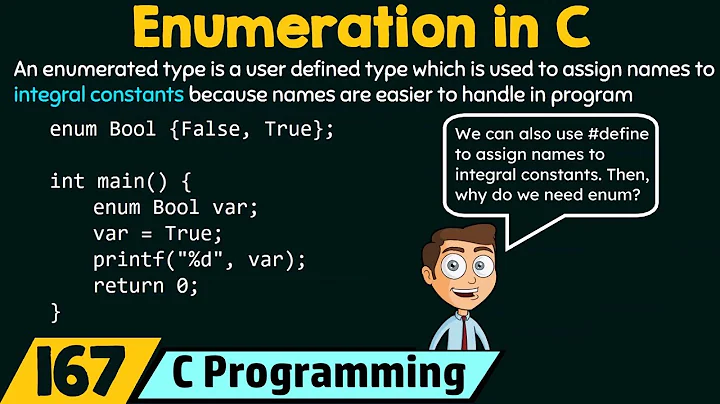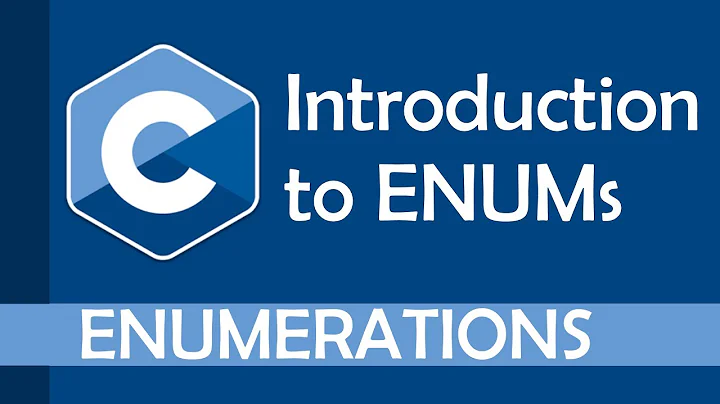What is the size of an enum in C?
Solution 1
An enum is only guaranteed to be large enough to hold int values. The compiler is free to choose the actual type used based on the enumeration constants defined so it can choose a smaller type if it can represent the values you define. If you need enumeration constants that don't fit into an int you will need to use compiler-specific extensions to do so.
Solution 2
Taken from the current C Standard (C99): http://www.open-std.org/JTC1/SC22/WG14/www/docs/n1256.pdf
6.7.2.2 Enumeration specifiers
[...]
Constraints
The expression that defines the value of an enumeration constant shall be an integer constant expression that has a value representable as an int.
[...]
Each enumerated type shall be compatible with char, a signed integer type, or an unsigned integer type. The choice of type is implementation-defined, but shall be capable of representing the values of all the members of the enumeration.
Not that compilers are any good at following the standard, but essentially: If your enum holds anything else than an int, you're in deep "unsupported behavior that may come back biting you in a year or two" territory.
Update: The latest publicly available draft of the C Standard (C11): http://www.open-std.org/JTC1/SC22/WG14/www/docs/n1570.pdf contains the same clauses. Hence, this answer still holds for C11.
Solution 3
While the previous answers are correct, some compilers have options to break the standard and use the smallest type that will contain all values.
Example with GCC (documentation in the GCC Manual):
enum ord {
FIRST = 1,
SECOND,
THIRD
} __attribute__ ((__packed__));
STATIC_ASSERT( sizeof(enum ord) == 1 )
Related videos on Youtube
mipadi
Just some guy, y'know? I write code for Industrial Light & Magic. I'm writing a book on Objective-C. Or rather, I was. Thanks to Apple, I'm now writing a book on Swift. You can check it out here. Oh, I also wrote a URL shortener for Stack Overflow profiles. Feel free to use it if you want!
Updated on February 28, 2021Comments
-
 mipadi almost 2 years
mipadi almost 2 yearsI'm creating a set of enum values, but I need each enum value to be 64 bits wide. If I recall correctly, an enum is generally the same size as an int; but I thought I read somewhere that (at least in GCC) the compiler can make the enum any width they need to be to hold their values. So, is it possible to have an enum that is 64 bits wide?
-
 jokoon over 10 yearsSo if I understand well, 2^32 enums are not enough for you ? Or is it an alignement concern, why do you need those to be 64 instead of 32, I'm very curious.
jokoon over 10 yearsSo if I understand well, 2^32 enums are not enough for you ? Or is it an alignement concern, why do you need those to be 64 instead of 32, I'm very curious. -
 mipadi almost 10 years@jokoon: I honestly don't remember anymore. I think I wanted the enums to contain values larger than 2^32-1.
mipadi almost 10 years@jokoon: I honestly don't remember anymore. I think I wanted the enums to contain values larger than 2^32-1. -
 Demi about 9 yearsOne use would be if you needed a union between an enum and a pointer.
Demi about 9 yearsOne use would be if you needed a union between an enum and a pointer. -
 AMDG over 1 yearAn important consideration in the size of
AMDG over 1 yearAn important consideration in the size ofenumis in fact memory use. Is memory optimization dead or something, or does everyone think the compiler is the center of the universe still and it automagically makes everything fast and optimal without any effort on the part of the programmer? It's absurd to use a larger data type than you need, and if I only need 256 values or less for my enum, then why do I need 16 or 32-bit words to store them? (Data model isn't an excuse. The values usually are quite easily sign-extended such as when stored in the registers.)
-
-
 Johannes Schaub - litb about 14 yearshaving only that, the following is valid i think: enum { LAST = INT_MAX, LAST1, LAST2 }; so LAST2 is not representable in int, but there wasn't an expression defining it.
Johannes Schaub - litb about 14 yearshaving only that, the following is valid i think: enum { LAST = INT_MAX, LAST1, LAST2 }; so LAST2 is not representable in int, but there wasn't an expression defining it. -
 Michael Stum about 14 yearsIn the actual PDF it defines that: "The identifiers in an enumerator list are declared as constants that have type int[...]". I've omitted that to make it not too verbose.
Michael Stum about 14 yearsIn the actual PDF it defines that: "The identifiers in an enumerator list are declared as constants that have type int[...]". I've omitted that to make it not too verbose. -
 HaskellElephant over 8 yearsYour first sentence seems to conflict with your last. Is the constraint that an
HaskellElephant over 8 yearsYour first sentence seems to conflict with your last. Is the constraint that anenumshould be larger than anintor smaller? Following @MichaelStum 's answer your first sentence should be "Anenumis only guaranteed to fit into anintvalue." -
 sleske over 7 yearsActually, as far as I can see this does not break the standard. As explained in Michael Stum's answer, the standard allows the compiler to choose the actual type of the enums, as long as all values fit.
sleske over 7 yearsActually, as far as I can see this does not break the standard. As explained in Michael Stum's answer, the standard allows the compiler to choose the actual type of the enums, as long as all values fit. -
 desowin about 7 yearsMichael Stum's answer is correct. This is compiler specific. You can try it out yourself with IAR EWARM. IAR EWARM shows 1 for your example. If there is up to 255 items it still shows 1. After adding 256th item it goes up to 2.
desowin about 7 yearsMichael Stum's answer is correct. This is compiler specific. You can try it out yourself with IAR EWARM. IAR EWARM shows 1 for your example. If there is up to 255 items it still shows 1. After adding 256th item it goes up to 2. -
 Admin almost 7 yearsNote "a signed integer type, or an unsigned integer type". Not necessarily
Admin almost 7 yearsNote "a signed integer type, or an unsigned integer type". Not necessarilyint.shortandlongare integer types too, and whatever the implementation picks, all values must fit ("shall be capable of representing the values of all the members of the enumeration"). -
 Michas over 6 yearsThe question is not about C++.
Michas over 6 yearsThe question is not about C++. -
 persiflage about 6 yearsI've worked with MacOS C++ compilers that do exploit the limited range of values in an enum to store them in smaller types. Can't remember if it was Metrowerks Codewarrior or XCode. This is within the C++ standard. You cannot assume sizeof(MyEnum) == sizeof(int) in general.
persiflage about 6 yearsI've worked with MacOS C++ compilers that do exploit the limited range of values in an enum to store them in smaller types. Can't remember if it was Metrowerks Codewarrior or XCode. This is within the C++ standard. You cannot assume sizeof(MyEnum) == sizeof(int) in general. -
 persiflage about 6 yearsAs an ugly implementation sensitive hack on twos complement platforms (is that all systems these days?), you can force an enum to be as large as an int by making sure it contains negative values. Not a recommended technique though.
persiflage about 6 yearsAs an ugly implementation sensitive hack on twos complement platforms (is that all systems these days?), you can force an enum to be as large as an int by making sure it contains negative values. Not a recommended technique though. -
 Frank Kusters over 5 yearsThis answer seems to suggest that an enum is as large as an
Frank Kusters over 5 yearsThis answer seems to suggest that an enum is as large as anint. Michael Stum's answer, which references C99, says that an enum may be as small as achar. -
 Lundin about 5 yearsNotable: enumeration constant and enumerated type is not the same thing. The former are the contents of the enum declaration list, the latter is the actual variable. So while the enumeration constants must be
Lundin about 5 yearsNotable: enumeration constant and enumerated type is not the same thing. The former are the contents of the enum declaration list, the latter is the actual variable. So while the enumeration constants must beint, the actual enumeration variable could be another type. This is a well-known inconsistency in the standard. -
 P O'Conbhui about 5 yearsTo clarify Lundin's point: For
P O'Conbhui about 5 yearsTo clarify Lundin's point: Forenum my_enum { my_value },my_valuewill have typeint, butenum my_enumcan have an implementation defined type which must at least represent all the enumeration values. Somy_valuemay have a narrowing conversion toenum my_enum, but it's guaranteed not to overflow. -
 underscore_d over 4 yearsimportant things to realise before writing any more C or C++: Just because it compiles doesn't mean it's legal per the Standard. Just because you get a given result doesn't mean the Standard says that you always will or that other users will when they run your code. Questions like this need an answer that references the Standard or at least implementation-defined spec for a given compiler/ABI. Simply compiling and running a program and seeing one result on one day conveys no lesson about such questions (and very little about anything else).
underscore_d over 4 yearsimportant things to realise before writing any more C or C++: Just because it compiles doesn't mean it's legal per the Standard. Just because you get a given result doesn't mean the Standard says that you always will or that other users will when they run your code. Questions like this need an answer that references the Standard or at least implementation-defined spec for a given compiler/ABI. Simply compiling and running a program and seeing one result on one day conveys no lesson about such questions (and very little about anything else). -
 M.M about 4 yearsThe first sentence of this answer is incorrect. The
M.M about 4 yearsThe first sentence of this answer is incorrect. Theenumis only guaranteed to be large enough to hold the value of the largest enumerator in the enum. -
 leopal almost 3 yearsWhile this code may answer the question, providing additional context regarding how and/or why it solves the problem would improve the answer's long-term value.
leopal almost 3 yearsWhile this code may answer the question, providing additional context regarding how and/or why it solves the problem would improve the answer's long-term value. -
 AlphaGoku almost 3 yearsarmcc gives the compiler option --enum_is_int.
AlphaGoku almost 3 yearsarmcc gives the compiler option --enum_is_int. -
 LocalHost about 2 yearsThis answer is more appropriate than the accepted one.
LocalHost about 2 yearsThis answer is more appropriate than the accepted one. -
 Mateo de Mayo almost 2 yearsThis is false. Compiling your example with gcc 8.4.0:
Mateo de Mayo almost 2 yearsThis is false. Compiling your example with gcc 8.4.0:sizeof(a)is 4 andsizeof(last)is 8. -
scirdan almost 2 yearstypedef enum {a1=0,b1,c1,d1,f1,last1=0xFFFFFFFFFFFFFFFF} testing1; typedef enum {a2=0,b2,c2,d2,f2,last2=0xFFFFFFFF} testing2; sizeof a variable of type testing1 is 8 and and sizeof a variable of type testing2 is 4..
-
 SO_fix_the_vote_sorting_bug over 1 year@M.M, he meant to hold a maximum of
SO_fix_the_vote_sorting_bug over 1 year@M.M, he meant to hold a maximum ofintvalues. It is a correct statement. Your statement is actually incorrect. Anenumwill not hold the largest enumerator if that enumerator is larger than anint. I learned this by having my 64-bit enumerator truncated to the maximum ofint(which is 32-bit in my case). -
 M.M over 1 year@jdk1.0 in Standard C all enumerators have type
M.M over 1 year@jdk1.0 in Standard C all enumerators have typeint. The behaviour you described is compiler-specific extensions -
 rsaxvc 12 monthsnot a short, just sometimes shorter
rsaxvc 12 monthsnot a short, just sometimes shorter





